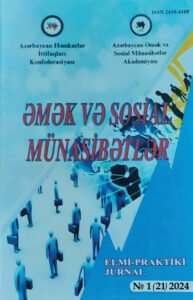№ 1 (21) 2024
The main press body of the Azerbaijan Academy of Labor and Social Relations is the scientific-practical magazine “Labor and Social Relations”. The magazine is published twice a year in the volume of 8-10 printed sheets, with a circulation of 200. Today, at a time when scientific journals are in the majority, the articles presented in the “Labor and social relations” scientific-practical journal show a high scientific level, training and strengthening of intellectual potential, improving the quality of education, contributing to the study of social labor relations problems, information technologies to apply the successes achieved in the field in recent years in international scientific cooperation, etc. such important tasks.
Scientific-practical magazine “Labor and social relations” is always open for intellectual discussions and exchange of ideas on scientific issues. Journal of social problems and economy of modern science, sociology, law, etc. It is a real discussion area of current issues related to development.

About article
TURKISHNESS AND ISLAM IN THE WORLD VIEW OF ABDULLA SUR
Faiq Ələkbərli
Azərbaycan Əmək Münasibətləri Akademiyası, Azərbaycan fəl.f.d., dosent faikalekperov@mail.ru http://orcid.org/0000-0002-8865-568x doi.org/10.61764/lasr.1.2024.11-22
ABSTRACT
On the basis of Abdulla Sur’s worldview, he called his compatriots and religious people to progress and enlightenment, and also showed the ways of revival and development of Turkishness with Islam. On the one hand, he tried to show the main essence of the problems of the TurkicMuslim peoples, who are currently living in the period of ignorance and backwardness, and on the other hand, he looked for ways out for the Eastern peoples, including the Turkic-Muslim nations, who are lagging behind compared to the West. Abdulla Sur, who fought for the progress of Azerbaijani Turks, believed that it is time for Turkish-Muslim peoples to create national societies and achieve national-religious unity, like all other nations. In particular, he considered it important to have a common Turkish language in the path of national unity, that is, the unity of the Turkic peoples. In our opinion, many of the considerations put forward by him regarding the state of the Turkish-Islamic world and the way out are still relevant today. Islam and Turkishness occupied an important place in Abdulla Sur’s worldview. He not only considered Islam against modernization, but declared that it is the basis of modernity and innovation. According to Sura, those who claim this are either ignorant of the true nature of Islam, or they deliberately confuse the public. According to him, true culture means Islam, and Islam is what true culture is. Sur declared that Turkish Turks and Azerbaijani Turks have the same language and roots. According to him, only Ottoman Turkish is more difficult to understand than Azerbaijani Turkish. The reason for this is that Ottoman Turkish is more influenced by ArabicPersian languages. From this point of view, he was in favor of simulating Azerbaijani literary Turkish to the Ottoman literary language. Sur believed that a common Turkish should be formed and developed outside the Arabic-Persian languages as much as possible between Ottoman and Turkish Turks. In his articles, Sur tried to reveal the essence of the Armenian-Muslim conflicts that erupted at the beginning of the 20th century, including the philosophy of “Armenian character”. It is clear from this that the cleansing of “Kars region and Iravan province on the border of Turkey” from Turks was not accidental, and the grounds for the creation of the “Armenian state” were created at the expense of these lands in the future.
Purpose – To analyze A.Sur’s views on enlightenment and society, including the ideas of Turkism and Islamism.
Methodology – comparative analysis, inheritance, transmission of ideas, analysis. The results of the study – Searching for reconciliations between the ideas of A. Sur and the socio-political and ideological requirements of the contemporary era
Keywords: Islamism, Turkish-Islamic union, Turkism, Russification, Persianization, Turanism, Enlightenment